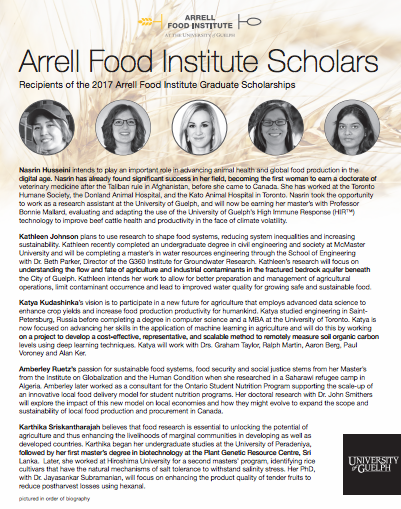 Earlier this year, the Arrell Family Foundation announced an astounding $20 million donation to the University of Guelph, the single largest gift the university has ever received. The University matched the funds, for a total commitment of $40 million, creating the Arrell Food Institute.
Earlier this year, the Arrell Family Foundation announced an astounding $20 million donation to the University of Guelph, the single largest gift the university has ever received. The University matched the funds, for a total commitment of $40 million, creating the Arrell Food Institute.
The Institute aims to transform the global food economy and further strengthen the university and country as agri-food leaders, with the funds enabling new research chairs and scholarships, international food innovation awards and a prestigious annual conference.
Since the initial donation in March, U of G has announced the first Arrell Food Institute Scholars.
“The generosity of the Arrell Family Foundation has given U of G the ability to recruit an unbelievably high calibre of students,” says Evan Fraser, Director of the Institute. “Not only do these students’ studies cover a range of fields, and not only are they academically exceptional, but they have all had significant leadership roles in communities beyond academia.”
The 5 inaugural scholars are from Sri Lanka, Russia, Afghanistan and Canada, with each studying distinct fields varying from data science to nutrition.
Among the 5 U of G graduate students receiving the new $50,000/year scholarships is Nasrin Husseini, a former Afghan refugee. Nasrin’s focus is on High Immune Response technology in Canadian beef feedlots, aiming to combat cattle disease.
Amberley Ruetz is looking to expand the scope and sustainability of local food production and procurement in Canada through an innovative local food delivery model for student nutrition programs.
Karthika Sriskantharajah will focus on enhancing the product quality of tender fruits to reduce post-harvest losses using hexanal.
Kathleen Johnson intends her work to allow for better preparation and management of agricultural operations, limit contaminant occurrence and lead to improved water quality for growing safe and sustainable food.
And Katya Kudashkina is working on a project to develop a cost-effective, representative, and scalable method to remotely measure soil organic carbon levels using deep learning techniques.
Congratulations to the Arrell Food Institute and their impressive scholars – we look forward to following along with their promising work.
